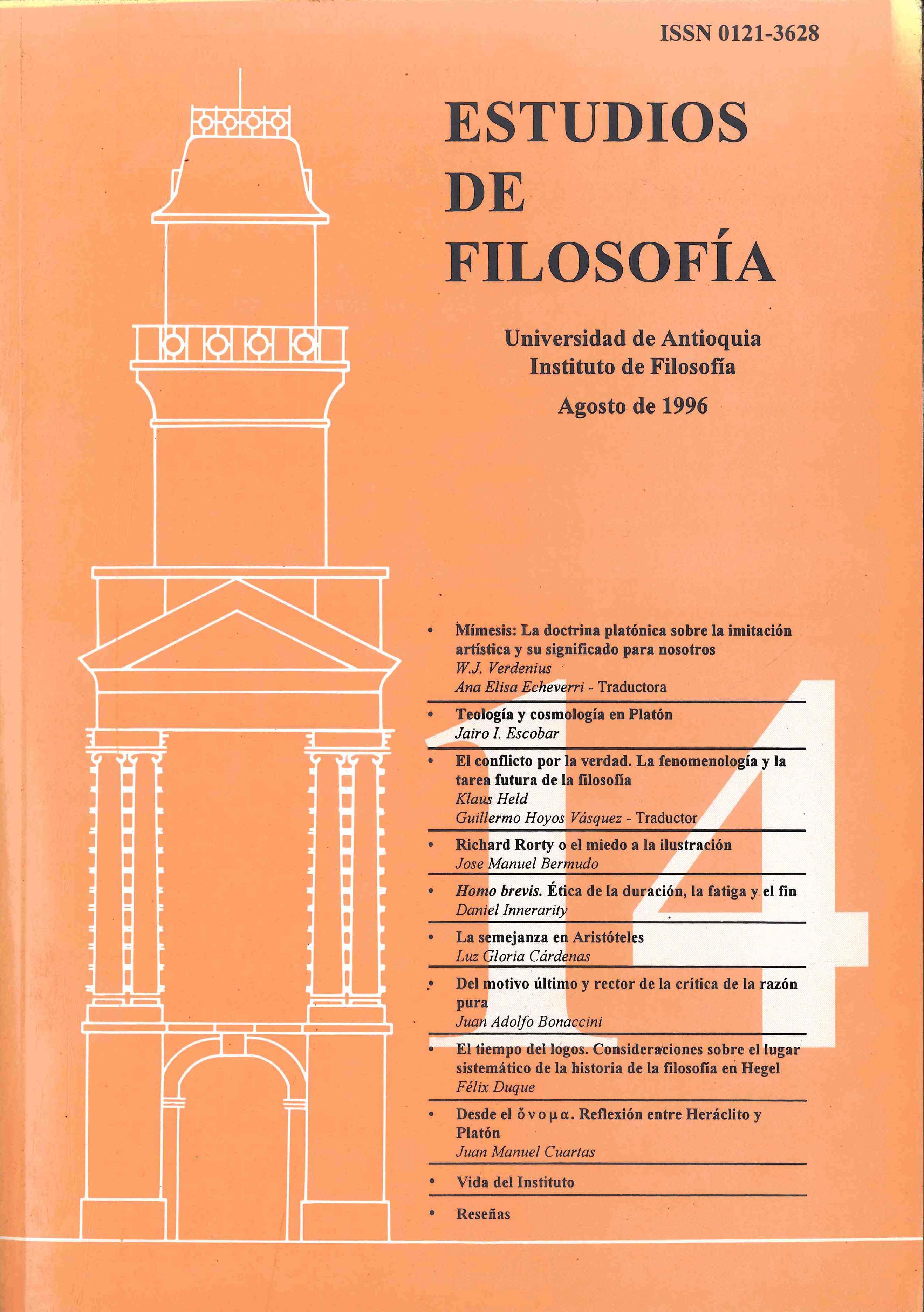Theology and cosmology in Plato
DOI:
https://doi.org/10.17533/udea.ef.338442Keywords:
Timaeus, demiurgos, KosmosAbstract
It is stated that the base of cosmological logos is the theology established in Plato 's Timaeus: So, the purpose of the mythic discourse pervading the whole dialogue is to draw the predominance of reason, beauty and arder (kosmos) in relation to chance and necessity in the world. This thesis is supported on a philosophical analysis of the role of divine Demiurgos in contrast to that of Christian and Greek gods. In the first case, it is not a question of exnihilo creation but of an ordering of pre-existent material. In the second case, there is not an anthropomorphic god but a "philanthropic" one, on whom it falls the responsibility of the existence of a cognoscible kosmos, model of human praxis.
Downloads
References
DIELS, Hermman; KRANZ, W. Die Fragmente der Vorsokratiker, gr-dt. 3 Bde. Zurich / Hildeshein: Weidmann, (17) 1989.
LOS FILÓSOFOS PRESOCRÁTICOS, Vols I, II, III. Introducción, traducción y numeración por C. Eggers Lan, V. Juliá, J. Olveri, E. La Croce, A. Poratti, M. I. Santa Cruz y N. Cordero, Madrid: Gredos, 1978-1980.
BURNET, John. Platonis opera recognerit breviaque adnotatione, Oxford: E Typographeo Clarendoniano, 1906- 1914.
PLATON. Werke in acht Banden, gr-dt. Hg. Gunter Eigler, Darmstat: Wissenschaftliche Buchgesellschaft, 1990.
PLATÓN. Diálogos. 7 Tomos. Madrid: Gredos, 1981-1992.
CARONE, Gabriela. La noción de Dios en el Timeo. Buenos Aires: Ed. Ricardo E. Sassone, 1991.
CONFORD, Francis Macdonald. Plato's Cosmology. The Timaeus of Plato, translated with a running commentary, London. 1937.
ESCOBAR MONCADA, Jairo. Chora und Chronos. Logos und Ananke in der Elemententheorie von Plato's Timaios, Wuppertal: Deimling Verlag, 1995.
HACKFORTH, R. Plato's theism En: R. E. ALLEN (Ed.), Studies in Plato 's Metaphysics, New York: Routledge and Kegan Paul, (3) 1968.
HELD, Klaus. Heraklit, Parmenides und der Anfang von Philosophie und Wissenscha: ft Eine Phanomenologische Besinnung. Berlin 1New York: De Gruyter, 1980. DOI: https://doi.org/10.1515/9783110837490
HIRSCH, Walter. Platos Weg zum Mythos. Berlin 1New York: De Gruyter, 1971. DOI: https://doi.org/10.1515/9783110820225
LOVEJOY, Arthur. La gran cadena del ser. Barcelona: Icaria. 1983.
MARTENS, Ekkehard. Platon. En: BÓHME, Gernot (Hg.). Klassiker der Naturphilosophie, l'viünchen. 1989.
VLASTOS, Gregory. Plato 's Universe. Seattle: University of Washington Press, 1975.
Downloads
Published
How to Cite
License
Copyright (c) 1996 Jairo Iván Escobar Moncada

This work is licensed under a Creative Commons Attribution-NonCommercial-ShareAlike 4.0 International License.
Authors who publish with this journal agree to the following terms:
1. The Author retains copyright in the Work, where the term "Work" shall include all digital objects that may result in subsequent electronic publication or distribution.
2. Upon acceptance of the Work, the author shall grant to the Publisher the right of first publication of the Work.
3. The Author shall grant to the Publisher a nonexclusive perpetual right and license to publish, archive, and make accessible the Work in whole or in part in all forms of media now or hereafter known under a Creative Commons Attribution-NoCommercia-ShareAlike (CC BY-NC-SA 4.0), or its equivalent, which, for the avoidance of doubt, allows others to copy, distribute, and transmit the Work under the following conditions: (a) Attribution: Other users must attribute the Work in the manner specified by the author as indicated on the journal Web site;(b) Noncommercial: Other users (including Publisher) may not use this Work for commercial purposes;
4. The Author is able to enter into separate, additional contractual arrangements for the nonexclusive distribution of the journal's published version of the Work (e.g., post it to an institutional repository or publish it in a book), as long as there is provided in the document an acknowledgement of its initial publication in this journal;
5. Authors are permitted, and Estudios de Filosofía promotes, to post online the preprint manuscript of the Work in institutional repositories or on their Websites prior to and during the submission process, as it can lead to productive exchanges, as well as earlier and greater citation of published work (see The Effect of Open Access). Any such posting made before acceptance and publication of the Work is expected be updated upon publication to include a reference to the Estudios de Filosofía's assigned URL to the Article and its final published version in Estudios de Filosofía.















